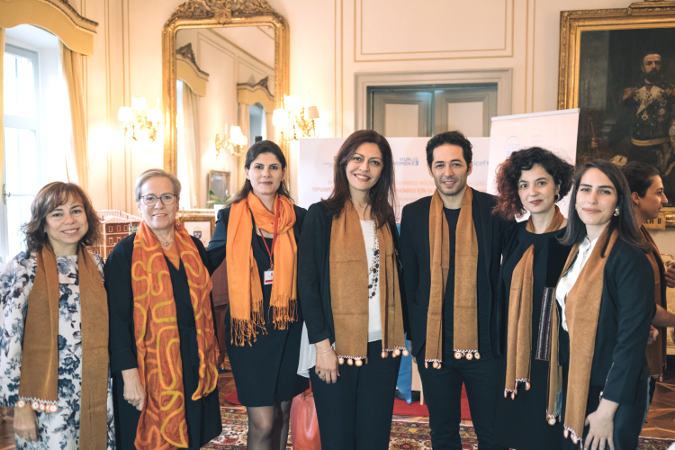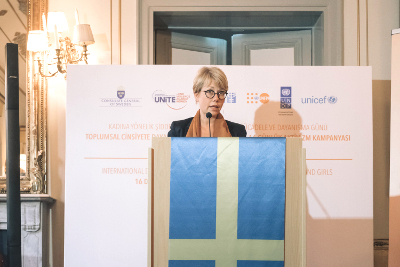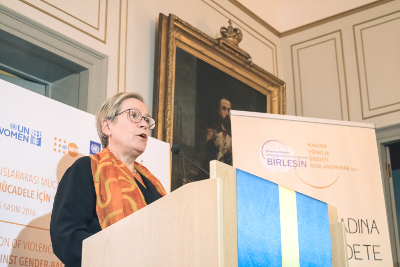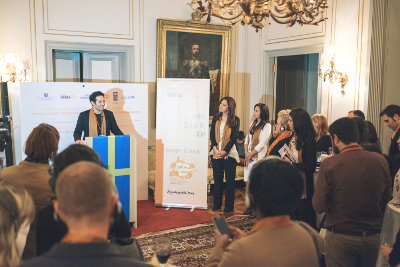Governments urged to invest in ending violence against women and girls
Participants at an event co-organized by UN Women to mark first day of the 16 Days of Activism say gender-based violence has significant, far-reaching impacts on families and communities and impedes achieving 2030 sustainable development goals (SDGs), which include targets to end violence against women and girls.Date:

Governments must provide more sustainable funding if violence against women and girls is to be ended, said participants at a recent Istanbul event to mark the first day of United Nations’ global 16 Days of Activism to End Gender-based Violence initiative, which mobilizes people and communities to act to end violence against women and girls.
Violence against women and girls is one of the world’s most widespread human rights violations, with one in every three women experiencing gender-based violence during their lifetime. In Turkey, 37.5 per cent of married women have experienced physical or sexual abuse, according to the 2014 National Domestic Violence Survey by the General Directorate on the Status of Women.
Following the adoption of the 2030 Sustainable Development Goals last year, which includes targets on ending violence against women, more resources are needed. Therefore, this year the theme of the 16 Days initiative, which every year sees buildings and landmarks around the world lit in orange in solidarity, is “Orange the world: Raise money to end violence against women and girls”.

Held at the Consulate General of Sweden in Istanbul, and jointly organized by UN Women, UNFPA, UNDP, UNICEF, the event included international representatives and Turkish academics, international organizations, the private sector and civil society advocates.
In her opening remarks, HE Ms. Therese Hyden, Consul General of Sweden said "Stopping men's violence against women – in Sweden and around the world – is an absolute priority for the Swedish Government. Freedom from physical, psychological and sexual violence is a main objective of Sweden's feminist foreign policy, including to ensure that such crimes do not go unpunished."
Speaking on behalf of the United Nations at the event, Ms. Ingibjorg Gisladottir, UN Women Regional Director for Europe and Central Asia and Representative to Turkey
noted that “Violence against women impedes achieving the 2030 sustainable development goals (SDGs) and has significant, far reaching economic impacts on families, communities and society at large.”
Calling for action from all corners of society, participants detailed how important gender equality was in ending the global pandemic of violence against women and urged governments to provide more sustainable funding to stop violence against women.

“Every day, the violence against women by men becomes more serious in Turkey. The resources needed to combat violence against women are extremely insufficient. We must raise funds and make them sustainable,” said Ms. Canan Arin, founder of Mor Çatı Women’s Shelter Foundation.
Participants called for urgent action by the government to guarantee equality between women and men and urged greater support for independent women’s organizations.
“Turkey has one of the world’s highest rates of child marriages, with 15 per cent of marriages here involving someone under the age of 18, and has not yet established a civil or penal mechanism focusing on forced marriages. Turkey needs an urgent action plan that guarantees equality between men and women in political representation and participation and employment,” said Professor Bertil Emrah Oder, Dean of the Law Faculty, Koç University.
“Supporting independent Turkish women’s organizations is more important than raising money. In Turkey, women’s associations are being shut down and women’s rights advocates are subject to serious assaults,” Ms. Gökçeçiçek Ayata, Member, Equality Watch Group (EŞİTİZ) told the audience.
Noting that fathers have an important role to play in changing social norms, Mr. Hasan Deniz, Director of the Family Education Department at the Mother & Child Education Foundation (ACEV) said: “Achieving gender equality is the best way to eliminate violence against women. To do this, we must both empower women and change men. Fatherhood is an important opportunity to transform men to achieve gender equality.”
Gender-based violence does not only affect women. Attorney Rozerin Seda Kip from the Social Policies, Gender Identity and Sexual Orientation Studies Association stated, “The fight for LGBTI rights all around the world also continues in Turkey… We must stress that the hate speech and acts that they face in everyday life are at least as intense and systematic as the discrimination and violence that women face.”

A gender equality advocate and supporter of UN Women’s HeForShe campaign, the Turkish actor Mr. Mert Firat agreed, saying: "Men should also contribute. Our laws need to be modern and implemented more rigorously."
A 2014 study found that 4 of 10 women in Turkey are exposed to physical or sexual violence. Conducted by the Institute of Population Studies, Hacettepe University, with support from the Ministry of Family and Social Policies, Directorate General on the Status of Women, the Violence Against Women Research study also found that:
- 48 per cent of women in Turkey who married before the age of 18 were exposed to physical violence;
- 3 of 10 women in Turkey marry before the age of 18;
- One third of girls in Turkey are not allowed to go to school by their families;
- 11 per cent of women in Turkey are prevented from joining the labour force by their families;
- Only 1 of 10 women in Turkey exposed to violence apply to an institution for assistance;
- 90 per cent of human trafficking victims in Turkey are women.